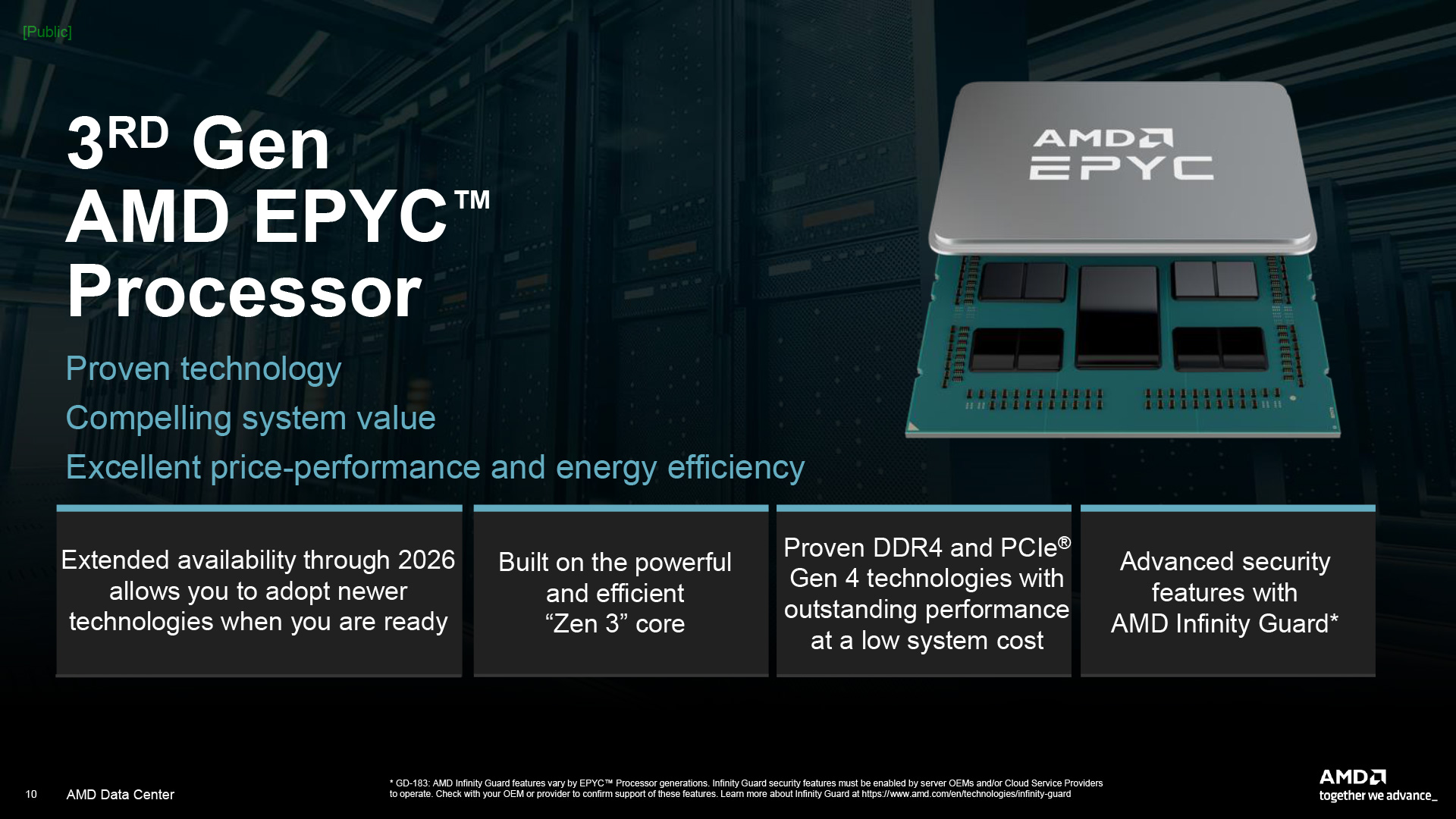
AMD has sent word over this morning that the company is extending the product lifecycle for their previous-generation EYPC 7003 “Milan” family of server CPUs. The company will now be offering the Zen 3-based CPUs through at least 2026, and as part of that extension plan, has already launched a further 6 SKUs. With these changes, Milan is effectively being repositioned as a budget server platform for AMD, offering AMD’s past tech at a discount to cost-weary customers.
First launched in early 2021, AMD’s EPYC 7003 “Milan” platform is based on the company’s Zen 3 architecture, offering chips with up to 64 CPU cores, 8 channels of DDR4 memory, and PCIe 4.0 connectivity. The platform has since been superseded by AMD’s numerous Zen 4-based EPYC 9004/8004 server platforms – Genoa, Bergamo, and Siena – but for continuity and support reasons, the Milan platform is still being offered to customers. And now, it seems, it will be for even longer than AMD was first expecting.
As of today, AMD is extending the availability of the Milan platform to 2026. All the while, the company is repositioning the platform as their newest budget offering, pitching it at customers who are on the trailing-edge of server technology and need a proven platform to upgrade to, but for whatever reason aren’t ready to upgrade to the 4th generation EPYC platforms. In practice, AMD is trying to entice Intel Xeon Scalable customers who are looking to replace their aging servers, but aren’t ready or eager to move on to 4th gen Xeon Scalable (Sapphire Rapids).
Competitively, Milan doesn’t offer much of note with regards to performance or features compared to AMD and Intel’s contemporary platforms. But for customers already invested in it and who need the ability to repair or bring online additional matching systems over the next couple of years, it will remain in service.
Meanwhile, the company is also re-launching 6 new Milan SKUs to underscore its position as a budget platform. All of these chips were first released by AMD back in September without much fanfare, but now that AMD is extending Milan’s availability to 2026, they are using the moment to spotlight their existence.
| AMD EPYC 7003 Milan New SKUs | ||||||||||
| AnandTech | Core/ Thread |
Base Freq |
1T Freq |
L3 Cache |
PCIe | Memory | TDP (W) |
cTDP (W) |
Price (1KU) |
|
| 7663P | 56 | 112 | 2000 | 3500 | 256MB | 128 x 4.0 | 8 x DDR4-3200 | 240 | 225-280 | $3,139 |
| 7643P | 48 | 96 | 2300 | 3600 | 256MB | 225 | 225-240 | $2,722 | ||
| 7303 | 16 | 32 | 2400 | 3400 | 64MB | 130 | 120-150 | $604 | ||
| 7303P | 16 | 32 | 2400 | 3400 | 64MB | 130 | 120-150 | $594 | ||
| 7203 | 8 | 16 | 2800 | 3400 | 64MB | 120 | 120-150 | $348 | ||
| 7203P | 8 | 16 | 2800 | 3400 | 64MB | 120 | 120-150 | $338 | ||
The 6 new chips are a bit of an eclectic mix. The top two SKUs – the 56-core 7663P and 48-core 7643P – are 1P-only versions of existing Milan chips at a lower price. Meanwhile the 7303 and 7203 parts are new, with AMD offering ultra-budget server chips with just 16 and 8 cores respectively. The 7203/7203P are true entry-level chips by server standards, with just 8 CPU cores, 64MB of L3 cache, and peak clockspeed well below AMD’s only other 8 core Milan (72F3). However, all of these chips come with the full I/O and memory channels supported by the Milan/SP3 platform, allowing AMD to position them as alternatives to the more limited EPYC 8004 Siena platform.







